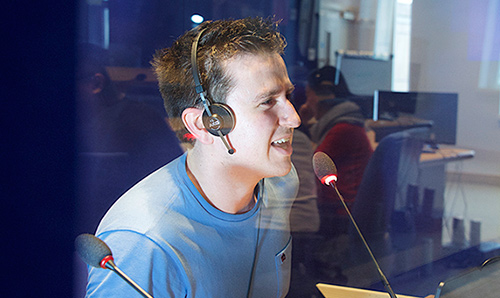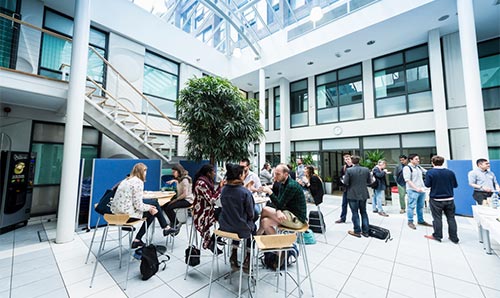
Postgraduate research in German Studies
We bring together leading specialists working in translation, interpreting, and German to offer a range of opportunities to our doctoral students.
View our range of programmes, and the support available for our postgraduate researchers.
Programmes
Finding a supervisor
Our postgraduate research students benefit from a very wide range of supervision, in history, literature, film and linguistics regarding all periods of the 20th century and beyond. We also have a strong record of success in joint supervision, allowing you to work with two supervisors who have complementary specialist fields.
Our team's research interests include:
- The cultural history of Imperial Germany
- Weimar culture
- Bertolt Brecht
- Modern German-Jewish culture and Holocaust studies
- Gender and sexuality studies
- The literary and cultural history of National Socialist Germany and the GDR
- Cultural Memory
- Turkish-German culture
- Translation and Intercultural studies
Current PhD students
Here's what some of our current doctoral students are working on:
- Matthew Heathcote - 'Der Kadavergehorsam: The Physical and Cultural Fashioning of the Prussian Soldier throughout the Nineteenth Century'
- Laura Schlagheck - 'Discourses of dangerous femininity and their relation to antisemitism, (colonial-)racism and antiziganism in Fin-de-Siècle Culture'
Past PhD students
Some of the recent research undertaken by our doctoral students:
- Ahmet Alver (2012) - 'The Politics of Memory: Aesthetics and Narrative in March 12th Novels'
- Eva-Maria Broomer - 'Melusine Figures in the Works of Theodor Fontane'
- David Charlston (2012) - 'An Analysis of the Translation of Intentional Ambiguities in three Translations of Hegel's Phenomenonology' (co-supervised with Maeve Olohan)
- Stuart Cunningham (2013) - 'The Impact of German Unification on the Sorbs'
- Leanne Dawson (2009) - 'Femme: Representations of Queer Femininities in Post-War German Culture'
- Michaela Dixon (2017) - 'Narratives of Resistance in Museums of the GDR and Third Reich'
- Sevinc Elaman (2012) - 'Gender Roles and the Image of 'New Woman' in the Works of Halide Edip Advar and Edith Wharton'
- Elaine Ellery (2006) - 'German-Jewish Literary Expression in the Third Reich with Particular Reference to Gertrud Kolmar'
- Pauline Eyre (2010) - 'Permission to Speak: Representations of the Disabled Body in German Women's Literature of the 1970s and 1980s'
- Chris Gribble (2001) - 'Theodor W. Adorno and Paul Celan'
- Jan Gryta (2016) - 'Cultural Memory and the City: Remembering Pre-War Jewish Life and the Holocaust in Krakow'
- William Hall (2018) - 'Space and Time in the Works of Hoffmann and Kleist'
- Aneta Jarzebska (2018) - 'Alternative Gallery Spaces in Poland and the GDR in the 1970s'
- Leif Jerram (2001) - 'Urban Planning in Early 20th Century Munich'
- Clare Murray - 'Post-Authoritarian Governmentality? Re-Negotiating the 'Other' Spaces of National Socialism in Unified Berlin'
- Gözde Naiboglu (2015) - 'Beyond Representation: Ethics and Aesthetics in Turkish-German Cinema since Unification'
- Rachel Ramsay (2010) - 'Jewish and Turkish Encounters in Contemporary German Language Literature'
- Kate Roy (2008) - 'Cartographies of Identity in the Works of Emine Sevgi Özdamar and Leila Sebbar'
- Sven de Roode (2009) - 'Perception of Europe and the European Union in Germany, the Netherlands and the United Kingdom in Comparative Perspective'
- Caroline Summers (2013) - 'Narrating Christa Wolf's Anglophone Author-Function'
- Helen Vahramian (2009) - 'Imperial Germany and the Ottoman Armenians'
- William Hall - 'Space and Time in the Works of Hoffmann and Kleist' (2018)
- Joseph Twist - 'From Gastarbeiter to Muslim: Cosmopolitan Responses to post 9/11 Islamophobia' (2015)
Funding opportunities
Find out about the bursaries, scholarships and studentships available to support postgraduate research.
Read more
Applying
Information about applying for a postgraduate research degree in the School of Arts, Languages and Cultures.
Read more
Our research
We're exploring the interface between politics, culture and identity in the modern German-speaking world across and beyond its national boundaries.
Read more

Facilities
Enjoy state-of-the-art facilities with purpose-built rooms, resources and access to Manchester's internationally renowned cultural assets.

Doctoral academy
Home to our postgraduate student community, the Graduate School provides a place to meet, access resources and organise events.
Translation and Intercultural Studies
We offer postgraduate research supervision across our languages in collaboration with our Translation and Intercultural Studies experts.
Read more
Linguistics and English Language
Our vibrant Linguistics and English Language department offers postgraduate research opportunities in combination with other modern languages.
Read more
